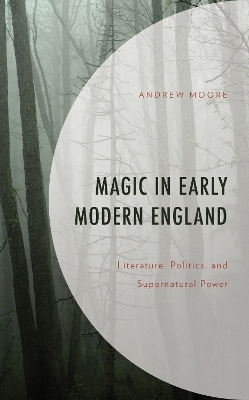
Magic in Early Modern England
Literature, Politics, and Supernatural Power
Seiten
2023
Lexington Books (Verlag)
978-1-4985-7551-5 (ISBN)
Lexington Books (Verlag)
978-1-4985-7551-5 (ISBN)
This book places early modern philosophy and political theory into conversation with sixteenth- and seventeenth-century writing on magic: plays, spell books, treatises, and witch trial narratives. Reading works by Hobbes and Bacon alongside writing by necromancers and witch-hunters reveals a broad cultural obsession with supernatural power.
This book reconsiders the place of magic at the foundations of modernity. Through careful close reading of plays, spell books, philosophical treatises, and witch trial narratives, Andrew Moore shows us that magic was ubiquitous in early modern England. Rather than a “decline of magic,” this study traces a broad cultural fascination with supernatural power. In the sixteenth and seventeenth centuries, poets, philosophers, jurists, and monarchs debated the reality and the morality of magic, and, by extension, the limits of human power. In this way, early modern English writing about magic was closely related to the scientific and political philosophical writing from the period, which was likewise reimagining humanity’s relationship to nature. Moore reads Thomas Hobbes’s Leviathan alongside contemporary writing by the notorious witch hunters Matthew Hopkins and John Stearne. He reminds us that Francis Bacon’s scientific works were addressed to King James I, whose own Dæmonologie insists on the reality of witchcraft. The fantastical science fiction of Margaret Cavendish, he argues, must be understood within a tradition that includes works like Christopher Marlowe’s Doctor Faustus and the peculiar autobiography of criminal astrologer Simon Forman. By considering these disparate works together Moore reveals the centrality of magic to the early modern project.
This book reconsiders the place of magic at the foundations of modernity. Through careful close reading of plays, spell books, philosophical treatises, and witch trial narratives, Andrew Moore shows us that magic was ubiquitous in early modern England. Rather than a “decline of magic,” this study traces a broad cultural fascination with supernatural power. In the sixteenth and seventeenth centuries, poets, philosophers, jurists, and monarchs debated the reality and the morality of magic, and, by extension, the limits of human power. In this way, early modern English writing about magic was closely related to the scientific and political philosophical writing from the period, which was likewise reimagining humanity’s relationship to nature. Moore reads Thomas Hobbes’s Leviathan alongside contemporary writing by the notorious witch hunters Matthew Hopkins and John Stearne. He reminds us that Francis Bacon’s scientific works were addressed to King James I, whose own Dæmonologie insists on the reality of witchcraft. The fantastical science fiction of Margaret Cavendish, he argues, must be understood within a tradition that includes works like Christopher Marlowe’s Doctor Faustus and the peculiar autobiography of criminal astrologer Simon Forman. By considering these disparate works together Moore reveals the centrality of magic to the early modern project.
Andrew Moore is associate professor at St. Thomas University in Canada. Lee Trepanier is professor at Samford University.
Chapter 1: The Ubiquity of Magic in Early Modern England
Chapter 2: Towards a Definition of Early Modern Magic: Four Conceptual Problems
Chapter 3: Magic and Materialism: Niccolò Machiavelli, Francis Bacon, and Abraham Cowley
Chapter 4: Magical Overreach in Robert Greene and Simon Forman
Chapter 5: Illusions of Power in Doctor Faustus and Francis Bacon
Chapter 6: Witch Trials and Thomas Hobbes
Chapter 7: Margaret Cavendish and the Conquest of the Blazing World
Conclusion
| Erscheinungsdatum | 26.04.2023 |
|---|---|
| Reihe/Serie | Politics, Literature, & Film |
| Verlagsort | Lanham, MD |
| Sprache | englisch |
| Maße | 159 x 238 mm |
| Gewicht | 454 g |
| Themenwelt | Geisteswissenschaften ► Sprach- / Literaturwissenschaft ► Anglistik / Amerikanistik |
| Geisteswissenschaften ► Sprach- / Literaturwissenschaft ► Literaturwissenschaft | |
| Sozialwissenschaften ► Politik / Verwaltung ► Politische Systeme | |
| Sozialwissenschaften ► Politik / Verwaltung ► Politische Theorie | |
| Sozialwissenschaften ► Politik / Verwaltung ► Staat / Verwaltung | |
| ISBN-10 | 1-4985-7551-X / 149857551X |
| ISBN-13 | 978-1-4985-7551-5 / 9781498575515 |
| Zustand | Neuware |
| Informationen gemäß Produktsicherheitsverordnung (GPSR) | |
| Haben Sie eine Frage zum Produkt? |
Mehr entdecken
aus dem Bereich
aus dem Bereich
Poetik eines sozialen Urteils
Buch | Hardcover (2023)
De Gruyter (Verlag)
59,95 €
Buch | Softcover (2024)
belleville (Verlag)
20,00 €


